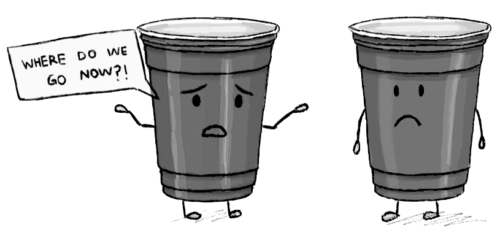During the fall of my sophomore year, I took what was the most transformative course in my college career, Lib Ec. Formally known as Econ 1017: A Libertarian Perspective on Economic and Social Policy, Lib Ec is a semester-long, empirically driven introduction to modern libertarianism taught by Professor Jeffrey Miron. The course lays out the libertarian perspective on a variety of policy issues ranging from insider trading to illegal drug markets—Miron’s area of interest.
The libertarian perspective on illegal drugs is relatively simple: the demand for drugs is inelastic, making prohibition costly and ineffective. When the supply of drugs is restricted, drug users turn to underground markets that are inherently more costly and dangerous. Libertarians support a regulated and open supply to make inevitable drug consumption safer for users.
The market for student tailgates functions similarly. The demand for tailgates is also inelastic, with students willing to go to great lengths to pre-game The Game. When the supply of the tailgates is restricted—when everyone from alumni to final clubs cannot pitch their tents and put out their booze—party-seekers turn to underground markets that are inherently less inclusive. It is naive to think that banning another MAC Lawn tailgate will stop students from getting belligerently drunk before marching down to the Colosseum. Instead, the parties will relocate from a public setting to private courtyards. Students lucky enough to get a friend’s plus-one will end up drunk anyway, and students without one will sardine themselves into sweaty dorms and slam vodka crans until they can neither see nor stand. And yet, in an interview with The Harvard Crimson, Dean of Students Thomas Dunne said “he hopes to avoid unsanctioned student tailgates” and that “the idea of tailgates popping up in different places is something that we don’t want to replicate.”
When I was a first-year, I woke up the morning of Harvard-Yale with nothing but a pounding headache and a hankering for a party. I was a freshman with little knowledge of the final club system and few friends who belonged to it. Still, when I went to the Mac Lawn with hundreds of other Harvard students, I felt none of the “exclusivity” Associate Dean of Student Engagement Jason Meier cited in a different Crimson interview. Instead, I was greeted with a warm drink and the first real excitement I had seen for a Harvard football game. As the morning turned to early afternoon and the tailgates were drunk dry, I got a sip of the school spirit I had only experienced vicariously through College GameDay. To this day, that tailgate remains one of the best memories of my time at Harvard.
Meier’s concerns are not unfounded. Our student body seldom rallies around our athletes—even last year’s Beanpot saw a lackluster Crimson student section. So, when presented with the opportunity to support our athletes and revel in Harvard pride, it’s understandable that students often overindulge. The relative rarity of such events, combined with the pressures of Harvard’s demanding environment and the impending reading week and final exam period, makes The Game a release valve for pent-up energy.
However, the blanket ban on unofficial tailgates does not eliminate excessive drinking—it merely relocates it to less visible, and thus, less manageable settings. Partygoers will turn to underground markets instead, making harm reduction nearly impossible. It is much easier to manage a few dozen tents with a few hundred students than a few hundred dorm parties with a few dozen students each.
If Meier really wants to keep our students safe, he should embrace the pride we take in the storied Harvard-Yale rivalry and allow us our tailgates. He should accept that students will drink and engage the undergraduate population in harm-reduction practices, set up hydration stations and launch educational programs on safe drinking, and remind students of the amnesty policy, which protects those who seek medical assistance for their inebriated friends from disciplinary action. But he should absolutely not drive the tailgates underground.
This principle of embracing harm reduction is not unique to tailgates—it has been successfully applied to drug policies, too. In 2010, Portugal decriminalized all drug use, including marijuana, cocaine and heroin. They shifted to a harm-reduction strategy that promoted access to treatment and recovery services for those struggling with addiction. Consequently, the number of fatal drug overdoses in the country has fallen by 80%. When consumption is inevitable, harm reduction is the most effective policy. Rather than wasting resources on futile attempts to suppress behavior, harm reduction acknowledges reality and focuses on minimizing its associated risks.
Meier’s ban does not eliminate behavior; it only pushes it out of sight where it becomes harder to monitor and control. A free-market approach, with proper oversight and support, is not only the more pragmatic solution—it is both safer and more inclusive. By fostering a sense of community rather than driving students into fragmented, clandestine gatherings, the administration could create an environment where school spirit thrives and student safety is prioritized. If Meier wants to take our fun away, so be it—but if he cares about the student body’s well-being and enjoyment of The Game, there is no better option than to embrace the student tailgate and make it as safe as possible.
Jonah Karafiol ’26 (jonahkarafiol@college.harvard.edu) wants you to pre-game The Game with the Indy.

